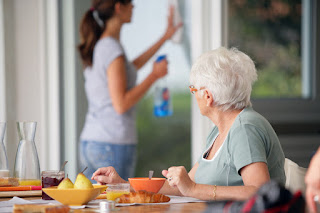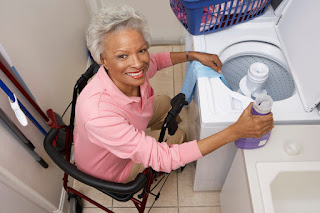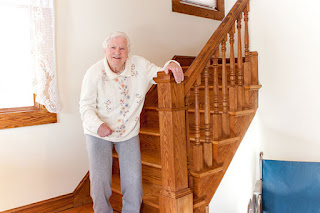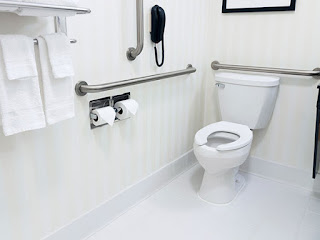Having a clean and organized home makes everyone feel good, but for seniors it is also a matter of health and safety as dust, mold, mildew and clutter can all too frequently create dangerous conditions. Whether your home needs a thorough cleaning or just a light sprucing up, here are some tips for seniors and their caregivers to help you tackle your spring-cleaning chores:
1) Focus on the Big Picture
Instead of giving one part of the house a deep cleaning, first focus on the big picture and make sure the home is safe. Home-safety experts agree that removing clutter should be at the top of the list of spring-cleaning chores for the elderly. Many older people who have collected a lifetime of property will often have so may belongings that a house may be difficult to clean. So before you just start dusting around the problem it is best to tackle the issue itself. If you are helping a senior with cleaning, don’t just start tossing out their belongings, but handle the situation with respect.
2) Tripping Hazards
Remove any tripping hazards, like piles of magazines and newspapers, and repair any tears in carpets or vinyl flooring. Remove or rearrange furniture that obstructs primary traffic pathway. If you are considering downsizing, ask family members if there are items they would like.
3) Wardrobe and Bedding
Box up winter clothes and place in storage until next fall to make room for summer attire. After swapping out the wardrobe, change out heavy quilts for lighter-weight blankets. Pillows should be replaced, or at least washed, to get rid of any odors causing bacteria and mold.
4) Window Treatments
Clean curtains, drapes and blinds by vacuuming to remove dust. Badly soiled drapes and curtains should be washed or dry cleaned and blinds can be washed with a sponge and mild soapy water.
5) The Kitchen
The refrigerator is an often overlooked part of spring cleaning. Clean the inside of the fridge by throwing away anything that is out of date, or that looks like a science experiment. Check the freezer for long forgotten items and defrost, if necessary. Clean underneath, around the back and especially the coils with a vacuum-brush attachment to remove built up dust and dirt. Organize the cabinets and pantry so more frequently-used item are easily accessible. Clean the stove top and range, and don't forget under the sink.
6) Appliances
For other household appliances, like the washer and dryer, HVAC unit and hot-water heater, clean around the outside of the units with the vacuum. It is also not a bad idea to have the HVAC unit and water heater professionally serviced.
7) Miscellaneous Indoor Chores
Clean and check the smoke alarm, carbon monoxide detectors and fire extinguishers. Check lighting fixtures and replace burned-out bulbs. Dust ceiling fans and wash windows.
8) Emergency Preparation
The emergency kit should be assessed and restocked in the spring, checking that there is a working flashlight with spare batteries, bandages, tape, scissors, antibiotic ointment, bottled water, energy bars and allergy medications. An up-to-date medication list with emergency contact names and number, including family members and friends, should be included in the kit.
9) The Garage
Spring is always a good time to clear out the garage and get rid of any items that have gone unused for too long. As a rule of thumb, if you haven't used something for over a year, it is just taking up space. Donate any still usable items and put the rest out for the recycle or trash man. Once the garage is cleaned and organized you may find you have room to store some of those things you just can't bear to part with, but don't have room for in the house.
10) Outdoor Furniture
Seniors with outdoor living areas, such as patios, should be sure their outdoor furniture gets a good spring cleaning with mild soap and water. A car washing wand with a soap dispenser it a made-to-order tool for this job. While you are at it, give the patio area a good once over also.
11) Clean the Grill
While not the most glamorous job, giving the barbecue grill a spring spit shine will have it ready and waiting for those summer cookouts. As a quick tip, non-toxic “cool” oven cleaners works like a charm on grills.
12) Walkways and Driveways
Sweep and rake the walk and drive and use the car-washing wand to clean concrete and asphalt. A pressure washer can be rented for a few dollars an hour to remove stubborn stains.
13) Yard Work
Dead foliage that has accumulated in the yard during the fall and winter should be removed as it can cause new growth to become diseased.
14) Roofs and Gutters
Cleaning the roofs and gutters are a very important tasks after a long winter. Leaves and storm debris should be removed and the roof surface and gutter should get a thorough cleaning to remove mold, mildew and caked on dirt and grime. However, unless the senior is the Jack LaLanne type, this is probably a job you should let someone else take care of.
15) Make Your Senior Feel Useful
Not all spring-cleaning jobs, like climbing and lifting, can be done by all elderly individuals. To keep yourself, or your senior if you are a caregiver, engaged stick to tasks that are suited to your personal fitness and comfort level, and get help with the rest. If you are a caregiver, remember it is your senior’s home, so always keep their wishes in mind.
16) Call in the Reserves
If all this spring-cleaning stuff seems like a lot of work, try to organize a group of family and friends to help out with a cleanup day, and reward them with a cookout. If, on the other hand, you would just rather not deal with all the hassles of spring cleaning yourself, you can hire professionals to do the work for you. Visiting Angels is a great resource for help with light housekeeping and organizational tasks.
Once your spring cleaning is complete, go out and reward yourself, or watch a baseball game, or just enjoy the spring weather.



